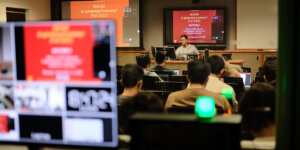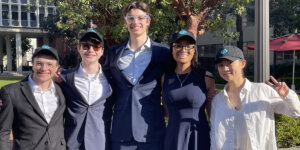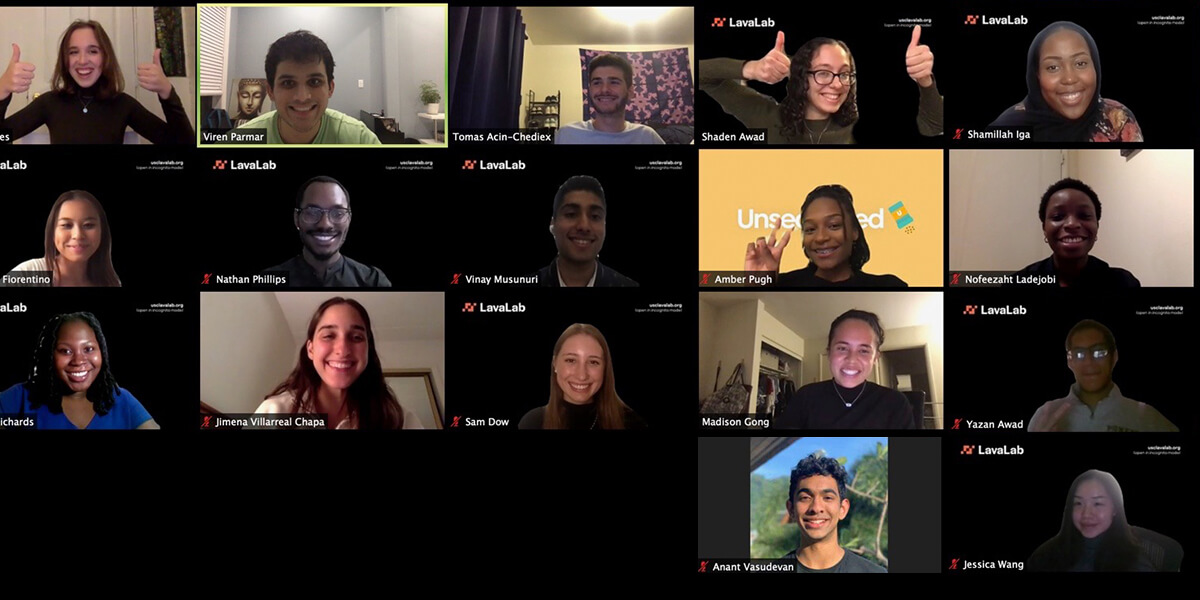
LavaLab’s aspiring entrepreneurs at the incubator’s online Demo Night (Photo/Courtesy of LavaLab)
Shamillah Iga has entrepreneurship in her blood.
A 20-year-old USC junior majoring in international relations – global business with a minor in entrepreneurship, Iga speaks proudly of her grandmother who solds goods in a local market in Mbale, Uganda, and of her mother who later started a successful small trucking business with her uncles in Ft. Worth, Texas. “I’ve always wanted to be an entrepreneur and give back to communities in need in the US and globally,” Iga said.
When she heard about LavaLab, USC Viterbi’s undergraduate student-run business incubator, Iga vowed that she would sharpen her entrepreneurial skills or perhaps launch a startup in the competitive, semester-long program. Her ambitions notwithstanding, Iga lacked the web development and product design background long sought by LavaLab. The incubator rejected her twice.
The Ugandan-born would-be business builder moved forward. After Iga’s older brother asked her to help him find hair moisturizer for his thick and curly hair, she discovered a void in the market: a paucity of quality haircare products for Black men. In short order, Iga decided to create a haircare company for Black men, after undertaking a feasibility study in a business class; came up with a company name, Nile Hair, in homage to the majestic African river that flows through her native Uganda; registered her burgeoning firm in Texas; secured the Instagram handle @nilehairllc; and obtained the domain name, nilehair.com, for a website.
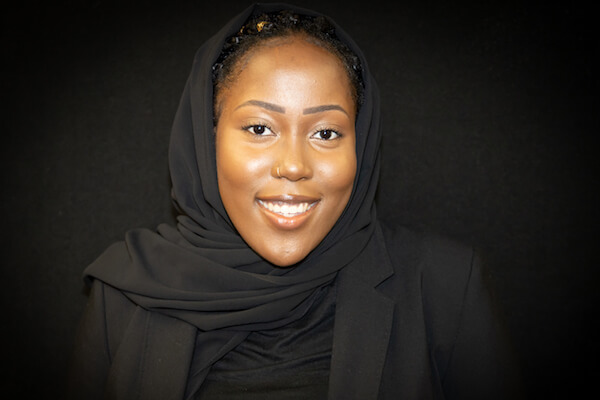
Nile Hair CEO Shamillah Iga (Photo/Courtesy of Shamillah Iga)
Prepared to go it alone, Iga reconsidered her plans after learning that LavaLab had radically overhauled its vision and now made a conscious decision to open its doors to students like Iga and men and women of color as never before.
“LavaLab doesn’t have many Black alumni or participants in the organization, and that is on LavaLab,” said Glory Kanes, the group’s president and a computer science and business double major. “That is on the way the we present ourselves. That is on the way that we recruit. That is on the way that the organization has been run. We wanted to change that.”
A more diverse LavaLab
Founded in 2013, LavaLab has grown into one of the premier student-run startup incubators in the nation. It has done so by bringing together a select group of ambitious and talented undergraduates and teaching them the basics in building a business, from ideation to product development to customer discovery, from website and app creation to raising money. Past guest speakers have included the likes of Tesla and SpaceX CEO Elon Musk, and LavaLab alumni have gone on to launch several successful companies, including Kyoku, a Los Angeles-based firm that sells shakes made from plant-based superfoods to cyclists for post-ride recovery.
Not surprisingly, a place in LavaLab has become highly coveted. In a typical semester, about 300 undergraduates apply for 28 spots, with most of those chosen having strong backgrounds in coding, design or product management — white and Asian males, for the most part.
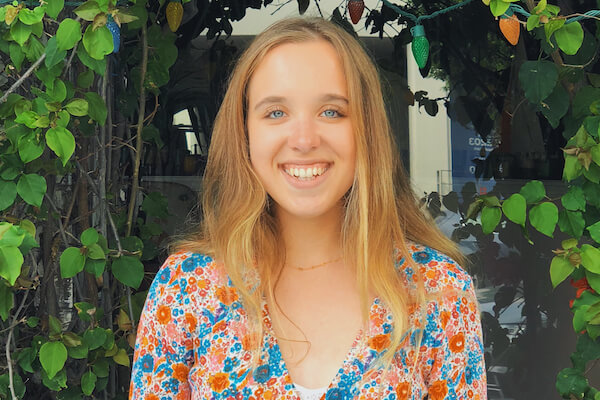
LavaLab President Glory Kanes (Photo/Courtesy of Glory Kanes)
After Floyd’s gruesome death and the social justice demonstrations that erupted in its aftermath, LavaLab President Kanes decided her group needed to make a statement. LavaLab’s executive board quickly released an 11-point call to action that included promises to actively cultivate relationships with Black students and clubs; emphasize diversity in its curriculum; and to add Black students to the executive board.
LavaLab leaders also committed to dramatically increasing the number of students from the Black, Indigenous and people of color (BIPOC) communities in the fall 2020 semester. To do so, LavaLab executives publicized news of the newfound BIPOC emphasis on the group’s Instagram account and partnered with the USC chapters of the Black Student Assembly and the National Society of Black Engineers, among other organizations, to spread the word.
“We want to make entrepreneurship available to all,” said Viren Parmar, LavaLab’s director of operations. In that spirit, he added, the group recently made its curriculum and workshop and lecture videos accessible on its website for free.
LavaLab has backed up its lofty ideas with action. This fall’s cohort of 12 – down from the typical 28, so LavaLab alumni could join student teams for the first time to professionally expedite product development, includes five Black, two Arab-American, one Anglo and three Asian students.
Iga was among them.
Shamillah Iga becomes an entrepreneur
In LavaLab, Iga was paired with a mentor, two software developers and two product designers. Working closely with them, she designed a company logo, established a branding strategy and built a robust website.
In January, Iga plans to launch her first product, a vegan, sulfate- and gluten-free moisturizer for hair and beards. She hopes to tap into what she characterizes as the growing but largely untapped nearly $768 million haircare market for Black men. By next year, Iga expects to sell Nile Hair products online and then through Black-owned barbershops and mass merchandisers such as Target and Walmart.
“I think my participation in LavaLab has really empowered me as an entrepreneur to know when to make big moves and set big goals,” she said. “I think it’s really helped me refine the product and brand to the point where we’re professional and well organized, and, I think, ready to be marketed to masses of people rather than just within my own community of friends and family.”
Bringing new ideas to LavaLab

Unseasoned CEO Amber Pugh (Photo/Courtesy of Amber Pugh)
Like Iga, Amber Pugh brought fresh ideas to LavaLab, which benefited from the presence of so many BIPOC students.
Thanks to her participation in the incubator, Pugh, a USC junior majoring in public relations with a minor in marketing, has created the foundation for a successful startup to promote healthy eating among the African-American community.
Pugh came to LavaLab with little more than a problem to solve: What could be done, she wondered, to encourage healthier eating habits among Black Americans, who suffer from high rates of heart disease and diabetes?
She first considered organizing farmer’s markets in her hometown of Chicago. However, her LabaLab mentor suggested that opening in the middle of a pandemic would be a challenge. Eventually, Pugh, in consultation with LavaLab alumni, settled on a YouTube channel where Black food influencers would come together to share healthy recipes and tips, complemented by an information-rich website.
Unseasoned was born.
“I plan to have a full-fledged company,” said Pugh, adding that her LavaLab teammates helped her with branding and a product roadmap. “The health food market is about $800 billion, but nobody’s targeting the Black community specifically.”
Going forward, Pugh envisions making Unseasoned a subscription-based service, with users supplying information about their eating habits and health in exchange for personalized dietary and other recommendations.
“The fact that I had full control over where my project went was even more empowering and made LavaLab a great experience,” she said.
Demo Night
On the evening of Thursday, Nov. 12, Iga’s Nile Hair, Pugh’s Unseasoned and six other burgeoning startups in different stages of development made their debut at LavaLab’s Demo Night. The eight burgeoning firms made three-minute presentations on Twitch and received feedback from industry professionals.
The fall 2020 roster of LavaLab startups included:
Nile Hair: Natural hair care for men.
Unseasoned: A platform that aims to destigmatize healthy food in the Black community and make a clean, nutritious diet accessible to all.
SchoolBucks: An app built in partnership with LAUSD to reengage and reignite students’ love for learning and personal growth through positive reinforcement.
Nova: A web app that acts as a resource for people experiencing homelessness to find shelter, hygiene, food, and mentorship in the long term..
Resilienz: An app with the goal of connecting and empowering college students to share their mental health experiences
Pod: Helps users find people with shared interests and initiate discussions. Pod allows users to talk, record, and share their discussion as a part of a community-generated podcast.
Reunite: A platform to streamline the process of finding missing people.
BlackGrid: A platform that aims to connect consumers to Black businesses owned by USC students and alumni in order to empower these businesses with social and financial exposure.
Although LavaLab plans to modify the selection process in choosing its new cohort of student entrepreneurs for the spring, group executives promise to continue their outreach to and recruitment of members of USC’s BIPOC community.
“We hope that all USC students feel that they cannot only apply to LavaLab, but that they could succeed in LavaLab, no matter their experience, no matter their skills, no matter their background,” Kanes said.
Pugh of Unseasoned thinks everybody benefits from a more inclusive approach.
“A lot of people like me weren’t exposed to these types of things growing up. I never knew about coding. I never knew about being a graphic designer. I never knew about all these different things,” she said. “So I think targeting this group targets a lot of people who didn’t even know they could be entrepreneurs. I think that’s really special and hope that LavaLab continues with some type of way to do this in the future.”
Published on November 23rd, 2020
Last updated on July 18th, 2022







